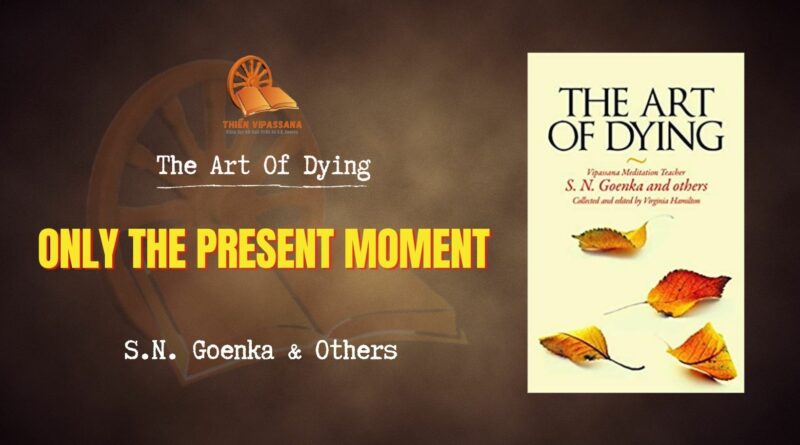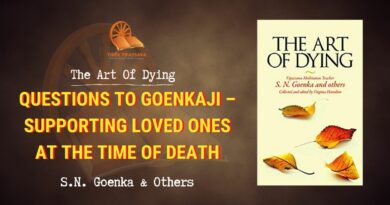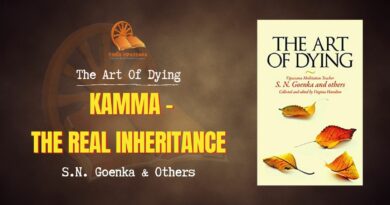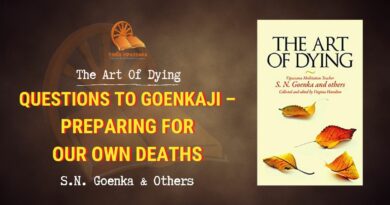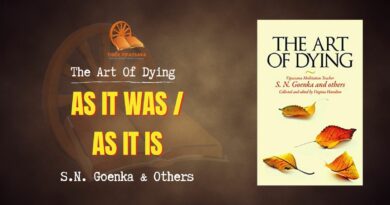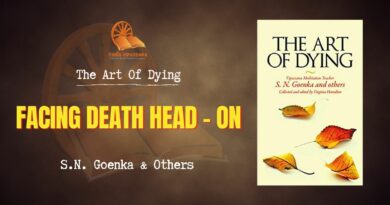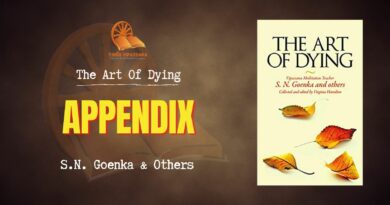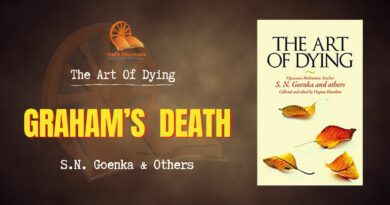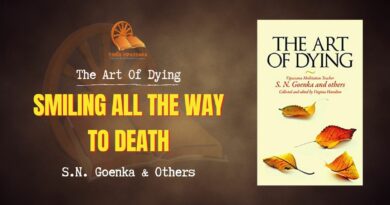Only the Present Moment
Susan Babbitt has been a professor at Queen’s University in Kingston, Ontario, Canada since 1990. She attended her first Vipassana course in 2004, and has since served a 10-day course and completed a 20-day course. The first interview took place in 2006, the second in 2007. Susan continues to teach at Queen’s, meditates daily and is still cancer-free in 2013.
Virginia: Can you tell us how you found Vipassana, and what your first course was like?
Susan: I was diagnosed with an aggressive form of cancer in August 2003. Until that point in my life I had no experience with illness or medicine. I had not even had the flu. The cancer diagnosis was a brutal assault on my sense of who I was. All of a sudden I was a seriously ill person. I looked for ways to get through this experience. At the beginning something called “guided imagery” was suggested to me, a form of imaginative positive thinking which I tried for several months as a way to escape my fear of what was happening. I used instructional audio tapes.
Then my friend Maureen, who was also going through cancer and who was doing well after treatments, died. I suddenly understood that the only way I would be able to live with cancer was to come to terms with the fact that my existence or non-existence was ultimately out of my control. People were saying to me, “This is not going to happen to you! Your case is different.” But I couldn’t distinguish myself from her like that. I knew that what happened to her could happen to me. The “positive thinking” approach leads one to believe that one has some control, and of course one does have some control, but the final result is not under my control.
It was clear to me that I had to be able to look at what was happening to me for what it was, to accept that death was indeed possible. I decided that I wanted to be able to expect the worst-case scenario, and to live with it; that is, to live my life with awareness of what could very well happen to me. Practically, this seemed the most reasonable thing to do. At that time I knew nothing about meditation or Vipassana. I had read here and there, in oncology books, that meditation is a good thing for cancer patients to learn. But I had no idea how to meditate, and when I tried to do it I failed.
Shortly after Maureen’s death the doctors recommended that I undergo chemotherapy therapy, which I had not expected. I hated the idea of chemotherapy therapy. I had had surgery on my leg followed by radiation. These I could handle, but everything about chemotherapy was awful to me—the idea that I would feel sick, that I would look sick, that everybody would know I was sick, that it was going to be from March to August, for the whole spring and summer of 2004, five months long. I was angry and resentful, and I thought, “How am I going to get through five months?”
I didn’t want to spend those months angry and resentful so I went to the social worker at the Kingston Regional Cancer Centre and asked, “What tools do you have to offer?” She gave me a book on Buddhism that I started to read. It had to do with compassion and loving-kindness, but after about four chapters I returned it. I asked, “How does this help me, practically, to get through five months of chemotherapy?” I was frustrated that there was no practical guidance.
I kept thinking about meditation, however, and remembered this Vipassana course I had heard about. I thought, well, if I’m going to learn how to meditate, I might as well go all the way; you can only learn meditation by doing it.
I found an application form and signed up. I had no idea what the course was about, except that it was about meditation. So I committed myself to the 10 days from March 24 to April 4, 2004, starting just a few days after the first chemotherapy treatment.
The course was extremely difficult for me, and for the first three days I questioned what I was doing there. On the fourth day, when Vipassana was taught, I became more interested. I had understood somehow, when Maureen died, that I wanted to be able to see things as they are, to be able to look at the real probability of death, and to live my life in the face of it. I didn’t want to be trying to make things look better than they might be—ever hoping desperately for good news, ever fearful of the bad. I had decided that I couldn’t live my life always looking for ways to separate myself from those getting the bad news.
With cancer, at least the kind I had, there’s no returning to your old life. You have to go for a CT scan every few months, and each time you go there is a real possibility of bad news. I didn’t want to lose my life to fear. I understood also that if I didn’t confront and accept the real possibility of death, fear would always be lurking over me, ready to descend and debilitate me at every indication that things were not going the way I wanted. I had decided that I wanted to be able to confront my reality and accept it for what it was, to live with it.
So I was surprised to learn that Vipassana is precisely the practice of looking at your reality just as it is, not as you want it to be. It is the systematic, hour-after-hour observation of your entire physical and mental experience. You incrementally gain thereby an experiential understanding of the real nature of your existence, which is, after all, impermanent. There is no turning of bad things into good things, as so many seem to try to do with disease and death. Instead, you look at things the way they are, which is the way of the entire universe, constantly changing. And when you gain such awareness, which must be experiential, meaning awareness that is felt, it makes no sense to identify yourself with either the good or the bad, and therefore to become debilitated by either desperate hope or by desperate fear.
It is strange that I somehow realized, intuitively, that I could not be free from the fear of disease and death unless I could see my experience of cancer in the worst possible way, and live with that. I don’t mean just to tolerate it, but to live in the face of that reality with full awareness of the precarious nature of my existence, even seeing the beauty of that ever-changing mysterious nature.
I learned at the Vipassana course that this is what the Buddha taught, not a religion, but a practical technique of mental discipline, cultivating freedom from the dominating expectations that lead us to think life should be a certain way—expectations that make us miserable when they fail, as they almost certainly do.
Of course I was still angry about the cancer because cancer wasn’t supposed to happen to me. Yet it was happening to me, and I knew that I could not make it go away. I knew also that I had to get out of the grip of unfounded expectations about how my life should be and move forward with open eyes. The simple practice of focusing my mind on the reality of my own bodily existence and becoming aware of its nature—such a simple idea—was, I discovered, the tool that I needed to go through chemotherapy, and much more.
One thing in particular that really appealed to me about the practice of Vipassana, which I learned at that first course, was that it was entirely practical. I did not have to believe in any unseen entities or forces, or depend on anyone or anything outside of myself: no symbols, special dress, or rites or rituals. Vipassana is a practical tool for training the mind. I was well aware of how much time I had lost from my life when my mind was out of control, somewhere else, reliving old dramas or spinning uselessly around the same old problems and fears. Vipassana teaches control of the mind so that we can live entirely in our world as it is, instead of forever running away into imagination or resentment.
So Vipassana helped me get through the awful process of chemotherapy and its consequences. I did not have to try to see chemotherapy as a good thing. Indeed, I looked at that chemotherapy experience as unacceptable. But I could also look at it objectively to some extent and say, “This is what is happening now.” I accepted it as my reality at this moment, as it is, and would start again from there without regret or disappointment
After the cancer treatments were over I went for a second Vipassana course at the end of 2004. Although I was not then dealing with cancer, I had other things to deal with. The second course was almost harder than the first, except that this time I understood why I was doing what I was doing. The course was painful, physically. I didn’t need to talk to the teacher because I knew what I had to do and I knew what he would tell me. I just looked at that pain over and over again and practiced equanimity.
At the end of the course, the teacher called me for a conversation and said, “You sat through it, you accepted it with awareness; that is all you can do. Your job is to be aware, even when the experience is unpleasant.” That course was important because I realized I had a lot of other things to deal with besides cancer. Cancer was only one thing in my life, and maybe not even the most important source of negativity, so I was motivated to keep up the practice.
What happened after your second course?
By the summer of 2005 my life was getting back to normal. I had regained the use of my leg and had fully returned to work. I was getting ready for my sabbatical when, in September, my leg became stiffer. On the first of October, which was actually the beginning of a three-month sabbatical, I found another lump on my leg. I knew even before the doctors did that it was recurrent cancer. The whole month of October was extremely difficult because I knew the cancer was back, but I didn’t know whether it had gone anywhere else. Moreover, the doctors hadn’t confirmed that it was back and I couldn’t really tell people about it. They couldn’t do the CT scan, to see if it had spread, until October 28.
Those four weeks were hell. I knew the cancer was back but I didn’t know the extent of it. I was going to have to go through the whole thing again. My career would again be interrupted and I was sure that, this time, I would lose my leg. What do you do with all these thoughts? All you have is your mind, and the fears go round and round. Where do you go to flee from your mind? I thought that if I hadn’t learned meditation I would’ve gone crazy. I could easily have fallen into a deep pit of despair and nobody would have blamed me, for it would have been completely reasonable.
Instead, I would sit amid those strong debilitating emotions, concentrate my mind, and patiently observe sensations, sometimes most of the night, and eventually the fears would loosen their hold. I found that I could coexist with the fears and grief, like looking straight into darkness, and eventually feel some peace knowing that it had to be this way, at least for now. I did manage to function that month. I helped my mother prepare for her trip to Ireland, and I did other things that I had to do, more or less normally.
I looked for a way to think about the possibility of death. Somebody gave me a book by a Vietnamese Buddhist monk. His ideas about life and death made sense to me, suggesting that we are like waves in the sea. Waves arise and disappear but the sea remains. Everybody has a right to live life as a wave but we also need to live our life as water. Life doesn’t go away; it just changes form, like the waters of the ocean, constantly moving. I also read the Persian poet Rumi who has beautiful things to say about acceptance. But when October 28 came around, I found that all these nice ideas did nothing to alleviate the grip of the terror I was feeling about the CT scan that might tell me the cancer had spread.
So that day, when I got ready for the appointment, I found myself going back to the practice of Vipassana, which is the simple experience of the rising and passing away of all sensory aspects of the entire bodily structure. In Vipassana you experience, by observing sensations, the real nature of all existence—dynamic, temporary, but real. When you experience your reality like that, how can you be afraid? For when you are aware of yourself as an integral part of larger, constantly unfolding natural phenomena, uncertainty is not so threatening and scary. It is now expected, not foreign, and therefore easier to live through. I was calm when I went to the hospital and even talked to a student about her thesis as I waited for the scan. As it turned out, I got good news that day.
It struck me that I hadn’t thought much before about the difference between intellectual and experiential understanding. I had been trying to prepare myself for bad news by looking for ideas. I discovered in the end that all those useful ideas I had gathered had given me some intellectual understanding but did not alleviate the fears. Intellectual understanding frequently is not real understanding. In the end I had to feel the truth about life and death through awareness of sensations. It was practical, felt awareness, not intellectual truths, that helped me get through that day.
Did that realization give you more confidence in your practice?
Yes, it did. I realized that my mistake had been to look for a theoretical understanding of death, and no merely intellectual understanding of death was going to help me confront it. We all know, intellectually, that we can die at any moment, but we don’t believe that this truth actually applies to us. It is abstract. We believe it, but we don’t feel the truth of what we believe, and it plays no real role in how we live our lives. It is a truth that does not matter to our lives. Meditation is the experience, moment after moment, hour after hour, of the uncertain nature of existence; and, in undergoing such an experience, death cannot be abstract, for its reality is there in each moment of real awareness.
I began radiation treatments at Princess Margaret Hospital in Toronto. I stayed at the hospital lodge for five weeks, going twice a day to the hospital for this very painful radiation. I didn’t feel like I had any kind of balance during this time. I was in a lot of pain and I didn’t like being away from home. I felt bad physically and I was losing hope. It’s easy to lose hope when physically you feel terrible.
At that time I didn’t have much peace of mind, but I remembered what one of my Vipassana instructors had told me: If you can’t maintain your balance of mind, just be aware that you don’t have balance of mind and you’ll still keep moving ahead. This is a powerful part of the Buddha’s teaching. It is not about being immediately successful. When things are going badly, I can still look at my reality as it is, aware of its ultimately impermanent nature, and start again from there.
The surgery to remove the tumor and save my leg was 13 hours long and the recovery was difficult. Finally I went home and began physiotherapy. It was now April 2006. The cancer was gone, spring had arrived, and I was becoming mobile again. But just one week after I left the hospital they told me the cancer was in my lungs. This was devastating news because when cancer has metastasized the prognosis is poor. They told me I had a 20 percent chance of living another five years, and that, of course, was hard to hear.
I was upset about this for three or four days and then, as in October 2005, I realized that I had to look at the fear and disappointment, and wait. Again, I was so thankful that I had a tool to deal with this, to deal with my mind and the grip of terror. People try to be helpful in such situations, but in the end you’re left with your mind. You’re alone with uncertainty and anguish. I would sit, hour after hour, and finally I found that I could be at peace with it. I could talk about the probability of death and even joke about it, which was surprising.
As I accepted the situation I realized that what was hard about the idea of dying was not that I would die soon, at 53 rather than 83 as I had always expected, but that I would die at all. It was not premature death that was hard, but death itself. I realized it was death that I thought could never happen to me, not premature death, or death by cancer.
One of the ideas that I had relied upon to try to accept death was something that Albert Einstein said: We fear death because we cling to an idea of ourselves as discrete individuals, but if we can see ourselves as part of the unfolding of the universe, which is beautiful in its complexity and mystery, we won’t be so fearful. This is what meditation allows me to do experientially, to understand myself as part of the unfolding of the universe, which is beautiful in its mystery. What we’re doing in meditation is experiencing, hour by hour, the rising and passing away, the impermanence, of all the sensations in the body. My reality, my entire physical and mental structure, is impermanent, changing from moment to moment, precisely as is the whole universe. Everything I’m part of is constantly changing too, moment to moment, and moreover is beautiful because of it. At the end of his life Einstein said that death had to be approached elegantly, that is, without fear—that we can’t run away from it. It’s the nature of our existence that we each are an integral part of the mysterious unfolding of the universe.
It has been through the practice of meditation that I realized that I can experience myself as part of this mysterious and complex unfolding of the universe. I now think that death won’t be so difficult if I can remain constantly aware of the ever- changing nature of my entire physical and mental structure. This takes practice. Thomas Merton said, “In silence is the victory over death.” He meant mental silence. In silence is the victory over death because it’s when your mind is quiet that you can appreciate the nature of your existence. In those moments, fear loses its grip.
You have time left in your life, but you don’t know how much; you have a goal to teach again as a philosopher. Has your presentation to students changed due to your experience?
The philosophical tradition that we teach in universities in Canada and the U.S. does not give importance to experiential understanding. It’s not that there aren’t philosophers who have talked about it, but we primarily teach people to analyze, to distinguish concepts, to define their terms clearly, to make and refute arguments. If the concept of experiential understanding exists in Western philosophical traditions, it is not prominent. I would like to use the two courses that I’m teaching to help students see the importance of experiential understanding.
Thomas Merton said that the greatest test of our freedom is death. We’ll all die sometime, but the approach we take toward death can make death a choice for life, not death. I’m never going to be happy about my death, but I can still be free while not happy. I can be free to look at that unhappiness and accept it, be at peace with it.
I’m in the position now of trying to live my life with death staring me in the face every day. I wake up to the reality that my life might end very soon, and I have realized that I can live with this if I can remain aware of the nature of my existence. I can live free from fear if I rely not merely on my intellectual understanding but on the experiential, on truths that are felt.
So, I would like to challenge my students to think about freedom and what it requires, and to get them to see that they must also seek the wisdom that is the result of what is lived. Philosophy is the love of wisdom. That is what the word means. But wisdom is acquired through experience. I’m afraid that what
we teach is not even philosophy. It is not about wisdom. We don’t teach people to live, to experience the truth of their lives. Instead, we teach them to watch themselves live, and to be content with being able to tell a good story, an intelligent, logically consistent story about who they are and what they have done. I would like to ask students to think about why our intellectual resources are so often useless for understanding something like death, which is also understanding existence, and what it means to be free.
Follow-up interview, December 2007
We last talked in the late spring of 2006. You ended up having more surgery that year and again in 2007. How did you get through that and back to teaching—and what happened afterward?
In April 2006 I learned that the cancer had spread and that my prognosis was poor, but the doctors did not tell me the disease was incurable. In a case of sarcoma, they treat lung metastases aggressively with surgery and some people do survive. But they said my chances were slim. They did the first lung surgery in May 2006 and removed seven malignant tumors. Then, almost immediately after, in June, there were more “nodules” showing in the scan. They did not recommend surgery again that summer so I returned to teaching in the fall.
I was happy to go back to teaching, although I was well aware of the cancer. A friend and colleague asked me recently why I wanted to go back to teaching, knowing, as I did, that my life would likely end soon. I told her that indeed there had been a time in the summer of 2006 when I thought that perhaps I should do something special with the rest of my now shortened life— maybe travel to some new places or write some important book. But when I reflected upon this, the idea struck me as ridiculous. I did not regret losing my life because of the things I might have done or accomplished, had I lived. I regretted losing my life because of life itself, the moment-by-moment experience of it.
I had once thought interesting the question of what I would do if I knew I had only months to live. But when I ended up in that situation, there was no such question: All I wanted to do were the ordinary everyday things that I had always done. I can’t say that I came to this conclusion because of the practice of Vipassana, for I know other cancer patients who have come to the same conclusion without meditation. Yet I do think it a result of practicing Vipassana that this truth was so easy to accept and to apply to what was left of my life. And I am certain that it was because of Vipassana that there was no sense whatsoever of sadness about this. There’s something tempting in the idea that death should be dramatic, and that something important should be done or said to mark the event, as if to underline the “meaning” of it all. Yet all I wanted for whatever was left of my very ordinary life was the quiet simple awareness of its most mundane aspects—no extra fun or excitement, and certainly no drama or sentimentality. What is ordinary is all the more miraculous when death is close. This is a truth I had already experienced through my practice of Vipassana.
So I went back to teaching and found it somehow easy in a way that it had not been before. I was doing what I had to do, what I had always done, and what I believed in, but I was not concerned about the importance of it. This is not to say that it wasn’t important. What I was doing and teaching was important and meaningful to me in the way it had always been, but it was not important that it was important and meaningful. What this means is that I found that I was living my life without watching myself live my life, without telling myself mental stories about how and why I was living my life. Somehow my relations with students were much easier and more direct.
I finished that fall term and had more operations in the winter of 2006–07. It was a tough time because one of the surgical procedures went wrong and I ended up with chronic pain and less mobility. But by autumn I had returned to teaching, again wondering whether I’d finish the term.
Then, in the middle of last October, almost immediately after I had been told by the oncologist that everything was OK, I got news that there was a large tumor near my heart. The news had come in a radiologist’s report. They had missed it in two previous scans. A few weeks later the doctors informed me that the tumor was inoperable but they could try some chemotherapy—however it would be only palliative, that is, it would be to stave off the symptoms and perhaps give me more time. That was the news I received in early November 2007.
When the doctor told you that he could offer only palliative treatment, what did you feel then? What were your expectations?
I talked to the oncologist by phone on the evening of November 5, and he told me then that I would probably live another three to six months if the chemotherapy did not work—and there was not much chance that it would. I was surprised that I was able to converse so calmly with him. I tried to get as much information as I could and also complained about the fact that the tumor had been missed by the radiologist in August. I told him too that I appreciated that he had saved my leg even though it now seemed like I wouldn’t survive after all.
When I finished the conversation I phoned my mother and gave her the news, calmly, although this was hard for her. Then I sat in my living room in the dark for several hours and quietly and dispassionately watched feelings of fear, despair, sadness, and anxiety. I had hoped to survive; now I would not. I could already feel the tumor pressing on my esophagus and so I expected that it would eventually choke me. I experienced a lot of anxiety about the process of death and what I had to do to prepare for it. I just watched these feelings, and after a long time I felt somehow comforted, for what I was seeing and accepting at that moment was just the nature of our human reality—utter insecurity and aloneness, with nothing to hang onto but the present moment. I had a sense of freedom and peace that night, feeling that I was then at the real center of my life, fully in touch with the entirely uncertain reality of my existence.
I still had almost half the semester ahead of me. But perhaps because I had spent so much time in meditation, being aware of what’s happening in my body and understanding that everything in the universe is constantly changing, dying, and coming back to life, the news that I might not be alive in three months seemed almost irrelevant. Of course it was shocking, and hard. But I had, in some small way at least, become used to the idea that I only ever have the present, and everybody else only has the present too.
As in 2006, I had this thought, momentarily, that perhaps, having just three months or so to live, I should say something important to the students, or do something special. It also struck me, though, that the best thing I could offer to them was an example. They’d know in a few months, if I died, what I had been living with, and I would have shown them that it is possible to live normally with the reality of death, which we all must do if we are not to lose our lives to fear. I didn’t want to give them, or anyone else, mere words. Somehow that seemed wrong. Words had not helped me face the fear of death, nor live with it, to the extent that I did, in peace. It was the practice of Vipassana, which is calmly and quietly seeing things as they are, that had helped me live with death so near. So I didn’t tell the students or my colleagues about my situation. If I had, I would not have been able to keep doing things normally as before, which is what I most wanted.
Nothing much changed in my life after I received that grave news. I had to teach my students and I found that I could. Occasionally it felt strange talking to students or listening to them do their presentations musing, “I will soon be dead, yet I’m sitting here listening to these presentations.” Then I would think, “But it is irrelevant, really irrelevant, because we are all in this situation. I have this moment and only this moment, and they also have this moment and only this moment. They don’t believe it, and they wouldn’t believe it if I told them, but this is the reality we all share.”
I felt that I was lucky to have had a year and a half expecting this sort of situation. This is not to say that I was negative and without hope, but rather that I had decided that I could live better with the disease, practically, if I expected the worst and lived with it—that is, if I expected death and learned to live normally with that expectation. When I began practicing Vipassana, I learned that this is just how anyone should live because this is the essential nature of our very fragile and precarious existence.
As a result of three years of Vipassana practice it was clear to me that all anyone has in her or his life are the ordinary simple everyday activities of the present, and the awareness of them. Of course, it is easy to say this, and many people do say this, as I did in the past. But since very few people pursue the quietness of mind that allows real awareness of the moment, many people just say this and at the same time lose their lives. As the Cuban philosopher José Martí warned, we have to work hard to claim our existence and, if we do not, our life will go by like the Guadiana River (in Spain) that flows quickly, silently, and invisibly beneath the earth, so that we barely even notice its passing.
Instead of saying my awareness, you seem now to be talking about the awareness, because what you are experiencing is that equanimous sense of the “I” as momentary, connecting to the next momentary “I” in the next present moment and the next present moment.
Maybe this is the most powerful thing that happens when one practices meditation daily: the ego falls away without one noticing it. In fact, it seems to be part of the nature of the experience of losing ego and becoming more aware of the present as a result, that no one notices it. I think this is one way that people get it wrong about mindfulness, which is a popular topic now. They make such an effort to be mindful of what they are doing that they are concentrating more on the effort they are making. But the ancient Chinese philosopher Chuang Tzu said that when the shoe fits, we don’t notice it. When you practice meditation day after day your mind becomes quieter and, as a result, more observant, and you become less concerned with what it means to be mindful. You just are. And when you are in fact mindful, aware of the present moment, you are not concerned about your “self” because the self falls away. It has to.
But this only happens with practice, over time, a lot of time. Without that slow patient process of loss of ego, you can’t ever really live in the present because you’re constantly concerned with what it means—mostly for yourself—to practice awareness of the present moment. When you really understand that your life only has meaning in the present, those questions about self-importance don’t matter, and you become free from debilitating, mostly fearful, self-analysis. If the effort toward mindfulness is a concern for self, then it is really not mindfulness at all, at least not in the liberating sense that the Buddha taught.
We’re all wrapped up in this concept of ego, this illusion of “I.” If the need to control is a result of the ego idea trying to hold on, do you feel this need fades as the ego fades? If control dissolves, how does this help deepen your equanimity, your sense of peace?
The prospect of death is very humbling, because when you lose your life and your future, you lose control. When I learned about the inoperable tumor, I also learned that it was there in the August report but that the radiologist had missed it. The doctors could have seen that tumor in August, maybe even in June, but they didn’t. I told the oncologist that this error needed to be addressed, but I didn’t really feel a lot of on going anger or resentment about it. I let it go.
No great anger that they missed the tumor in June?
I told the oncologist that I didn’t care about pursuing this question but someone should care because someone screwed up and I was losing my life. He said, “You should raise it, because it goes further if the patient raises it.” “Well,” I replied, “I’d have to be stupid to spend the last months of my life doing that. You just informed me I’m going to die. Why would I want to go chasing the guy who screwed up? You should do that. It’s your job. It’s your hospital.” After that I never thought about it again.
Was that loss of control, or loss of ego?
I just wanted to see that it got corrected so that it didn’t happen to anyone else. But I was surprised that I didn’t care more because that error was extremely costly to me. Maybe they could have saved my life if they’d seen the tumor back in June or in August.
What about the teaching of the Buddha that we alone are completely responsible for what we’ve done in the past; that what happened in the past conditions what happens in the present?
Well, I always remember that Goenkaji said we have responsibility for just the present moment. Occasionally I wonder what I did in the past to have brought all this upon myself—four years of cancer treatment—but then I remember that I have responsibility for only what’s happening now, and that’s enough. I have to practice that part of it. That’s the part that frees me from the bondage of resentment and anger. On some level I hate all this stuff—pain, doctors’ appointments, medications, treatments, IV lines, nursing care, dependence, being in the hospital again and again. I was so healthy, strong, and athletic before this. It would be easy, perhaps even reasonable, to fall into a pit of resentment.
When you indulge in that resentment, you’ve lost the present moment.
Yes. Vipassana is a very important tool. I just start looking at the breath. All those nights in the hospital—hot, stuffy, claustrophobic—there’s nothing to like about it. But you concentrate on breathing and you’re there in the moment, and eventually it’s over. And then you leave until the next time. But I have to practice it, like anything else.
You might have two months left; you might have two years, or more. During that time, what is the most important thing for you to do in order to finish things well?
I believe very much in simplicity and silence, by which I mean silence of the mind. I don’t find myself thinking very much about how things will be until I die. I trust what Goenkaji says, that if you practice daily, in the end you’ll have the resources to deal with it. I know from talking to people who work in palliative medicine that the process of dying can unfold in many ways. So I just want to live each moment, as much as possible, with peace and awareness. And I want that to be easy, like a shoe that fits. I know that that only happens with mental discipline built up through the wonderful daily practice of meditation. I’m grateful to have learned the miracle of silence, not the exterior silence that can be experienced even in agitation, but interior silence that is freedom from mental conversations rooted in fear and self-importance, robbing you of sensitivity to the here and now.
I can’t really think past January, a few weeks from now, when I’ll go for the next chemotherapy treatment. The last time I went to the hospital the doctor told me that the tumor had grown and he was going to send me home without any more treatments. I sat alone in the hospital after one chemotherapy treatment—my ride had left thinking I was supposed to be there for four days of treatment—and he was telling me that the thing hadn’t shrunk, or even stabilized, but that it was larger. I was surprised that I just listened to what he said and was not particularly agitated. I didn’t expect bad news that day, and this was really bad news. As it turned out—four hours later—the oncologist ordered another scan and determined that, although the tumor was larger, it had lost 75 per cent of its mass, so he decided to continue the chemotherapy. That was another hard day. The only way to get through these things is to practice staying right there in the present moment.
You were surprised but you didn’t react. Was some part of your mind equanimously watching sensations because you’d trained yourself to do so?
Perhaps. I can imagine people falling apart. I can easily imagine myself falling apart. This was the worst news. They had said there was a small chance that the chemotherapy would work and now the doctor was saying that that small chance didn’t exist, it wasn’t happening.
You said that you didn’t want this period of your life, however long it is, to be taken from you, that you want to live each present moment. Can you put this idea into words once more?
Yes, that’s true. It’s a practical problem. I don’t want to lose whatever is left of my life to fear, anger, resentment, and regret. And the only way I can do that is to look at what’s happening right now and not at what I would like to be happening—to see things as they are and to be free from expectations about how things ought to be.
Your freedom comes from being in the present moment and not reacting?
Yes. I know now that you have to feel the truth of this idea. People talk so much now about mindfulness. It’s trendy. But it’s all about self-importance. I am aware. I am in the present. When you really are aware of yourself in the present, you are not aware that you are aware. You don’t think about that awareness itself. What you are aware of is the arising and passing away of each moment in time. You cannot at the same time be stuck on yourself and your significance, because that too is arising and passing away, forever. The nature of our existence is, after all, impermanent. We all know this and say it again and again, but when you feel this truth at each moment in time you also lose the concern for self. It’s not a big deal. It’s a simple idea, but at the same time very hard. Whether I’m going to be dead soon or whether I’m not going to be dead soon, I really have only this, the present moment.
Kṣhaṇa kṣhaṇa kṣhaṇa kṣhaṇa bītate,
jīvana bītā jāya.
Kṣhaṇa kṣhaṇa kā upayoga kara,
bītā kṣhaṇa nā āya.
Moment after moment after moment, life keeps slipping by. Make use of every moment; the moment past will never come again.
—Hindi doha, S.N. Goenka
Bài viết này được trích từ cuốn sách The Art of Dying – Thiền Sư S.N.Goenka và nhiều tác giả khác.

